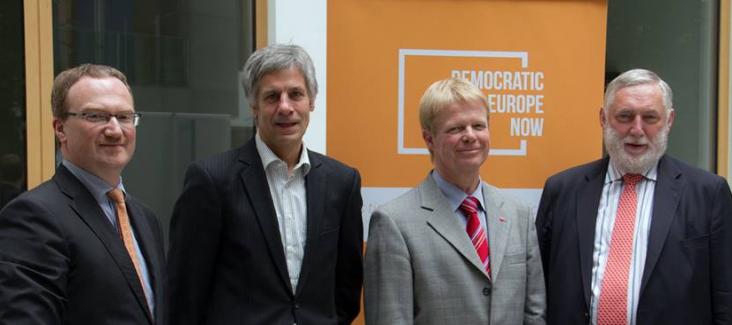The 2014 European Parliament elections demonstrated the faltering citizen confidence in the current state of the EU and the need for fundamental democratic reform, with voter turnout remaining at the bottom of a long downward trend at 43%, and the strong electoral performance of eurosceptic parties delivering them more than 20% of the seats in the new Parliament. The only way to win back the trust of the citizens is by making the EU more democratic: debates about the future of Europe should not be controlled by Heads of State and Government behind closed doors - they should be discussed and developed in public.
In order to open up the debate and rethink the relationship between the EU and the citizens we need a new European Convention. The Convention must be transparent and democratic, with the direct involvement of civil society. Citizens should have the chance to vote on the outcome of the Convention in a pan-European referendum in all Member States on the same day, providing democratic legitimacy to the reforms.
In the lead-up to the 2014 EU Elections more than 1,400 candidates - from every EU Member State and every major party - pledged support for a new EU Convention on democratic reform. According to Democratic Europe Now almost 150 of these supporters were elected to the European Parliament, forming a serious base of support for a new Convention in the next legislative period.
“Europe needs an immediate change of course - it must become more social and more democratic”, said Hoffmann, chair of the DGB. “A new Convention must be initiated as soon as possible to put an end to the backroom-deal politics of the Council.”
Former Austrian agriculture Commissioner Fischler sees the EU at a crossroads: “No more intergovernmental deals, but instead European decisions. The EU needs to learn her lessons from the crisis and become more democratic. This requires treaty reform, which can only be achieved with a Convention.”
The German economist Feld said: “From a politico-economic perspective, a Convention is urgently needed. The outcomes of the Convention must be put to a referendum all over Europe, in order to make sure that the Convention's proposals are geared toward the interests of the people. This is the only way to ensure a democratic foundation for the future Europe.”
“Without democracy Europe has no future,” said Gerald Häfner, Member of European Parliament on behalf of the campaign Democratic Europe Now and Democracy International. “We need a Europe of the citizens - and an open and democratic debate about the future of Europe. For this, we are calling for an EU Convention, which has enough time for deliberation, which involves civil society and whose results are subject to a popular vote by the European citizens.”
According to Article 48 of the Lisbon Treaty, a Convention is the only legal way to achieve substantial reform of EU treaties. A Convention is an assembly of representatives of the national Parliaments, of the Heads of State or Government of the Member States, of the European Parliament and the Commission, who will jointly decide on treaty reforms.
For more information: www.democraticeuropenow.eu

